The Social Construction of Illness: Examining Deviance and its Impact
VerifiedAdded on 2023/01/05
|7
|1947
|35
Essay
AI Summary
This essay delves into the sociological understanding of illness as a form of deviance, examining how societal norms and values influence the perception and treatment of individuals experiencing health issues. It explores various theoretical frameworks, including functionalism, conflict theory, and labeling theory, to analyze the social construction of illness and its implications. The essay discusses the concept of the "sick role" and how it relates to social expectations and obligations. It also considers the impact of social inequalities, such as poverty and gender, on mental health and the labeling of individuals as deviant. The analysis highlights the influence of societal structures and power dynamics in shaping the definition and experience of illness, concluding with a reflection on the changing perceptions of deviance over time. The essay provides a comprehensive overview of the sociological perspectives on illness and its relationship to deviance.
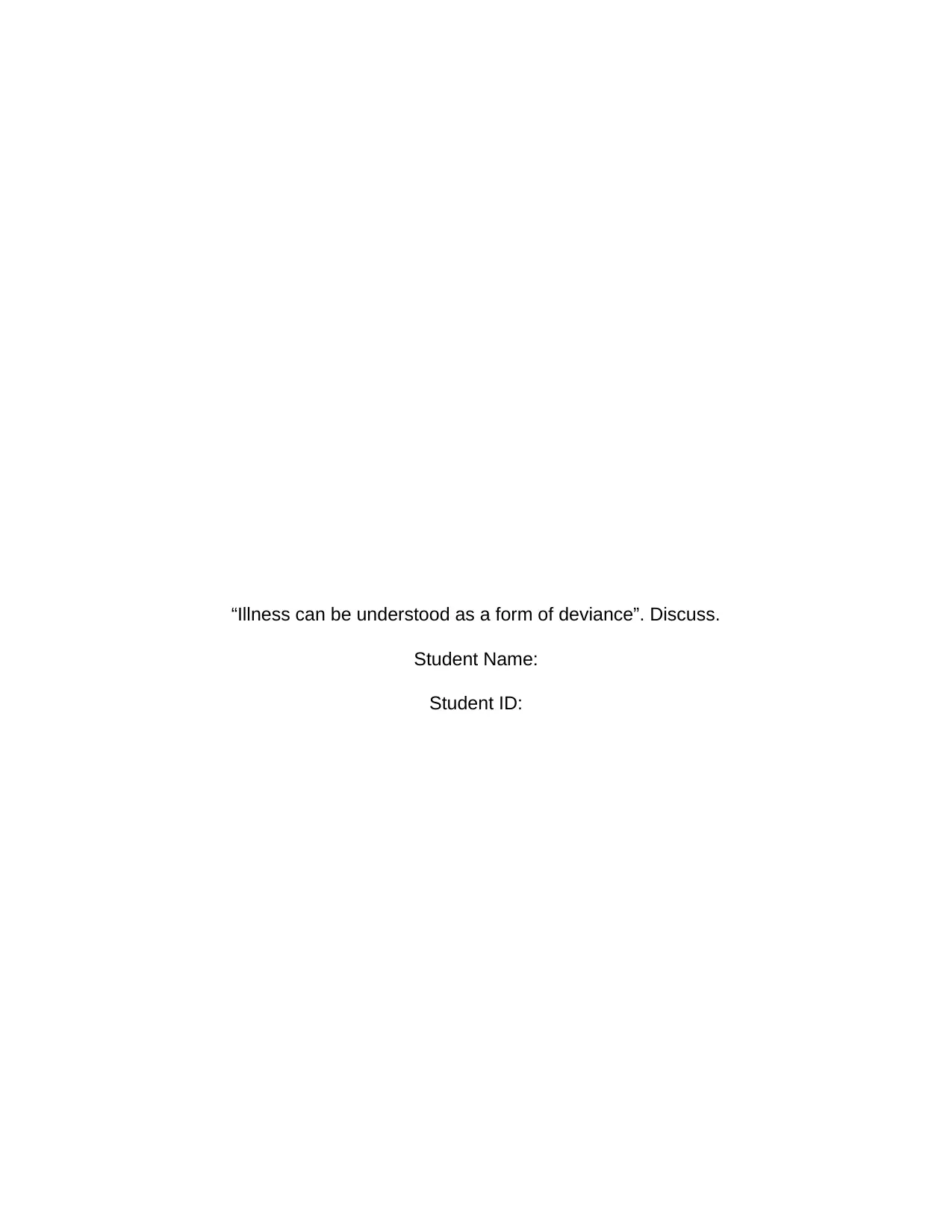
“Illness can be understood as a form of deviance”. Discuss.
Student Name:
Student ID:
Student Name:
Student ID:
Paraphrase This Document
Need a fresh take? Get an instant paraphrase of this document with our AI Paraphraser
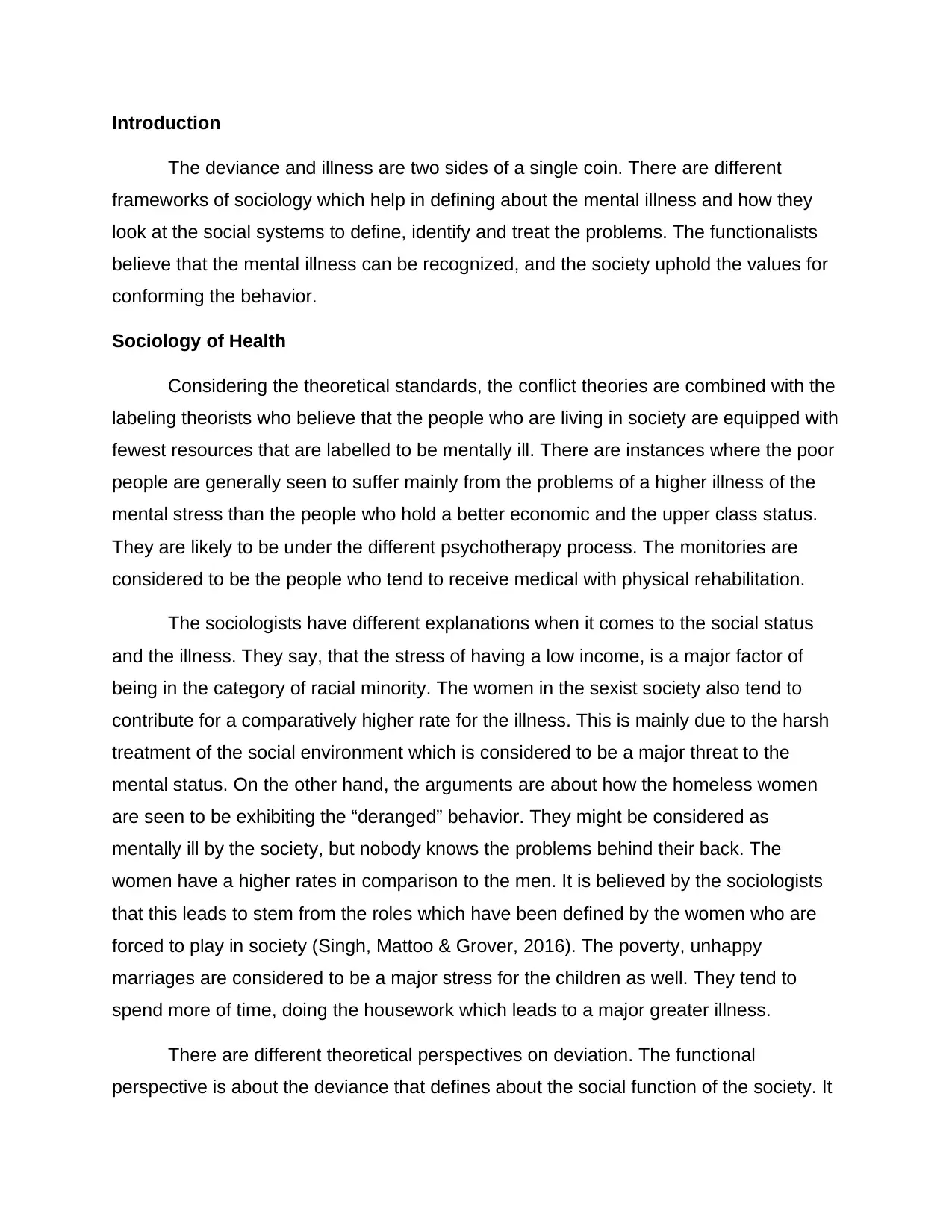
Introduction
The deviance and illness are two sides of a single coin. There are different
frameworks of sociology which help in defining about the mental illness and how they
look at the social systems to define, identify and treat the problems. The functionalists
believe that the mental illness can be recognized, and the society uphold the values for
conforming the behavior.
Sociology of Health
Considering the theoretical standards, the conflict theories are combined with the
labeling theorists who believe that the people who are living in society are equipped with
fewest resources that are labelled to be mentally ill. There are instances where the poor
people are generally seen to suffer mainly from the problems of a higher illness of the
mental stress than the people who hold a better economic and the upper class status.
They are likely to be under the different psychotherapy process. The monitories are
considered to be the people who tend to receive medical with physical rehabilitation.
The sociologists have different explanations when it comes to the social status
and the illness. They say, that the stress of having a low income, is a major factor of
being in the category of racial minority. The women in the sexist society also tend to
contribute for a comparatively higher rate for the illness. This is mainly due to the harsh
treatment of the social environment which is considered to be a major threat to the
mental status. On the other hand, the arguments are about how the homeless women
are seen to be exhibiting the “deranged” behavior. They might be considered as
mentally ill by the society, but nobody knows the problems behind their back. The
women have a higher rates in comparison to the men. It is believed by the sociologists
that this leads to stem from the roles which have been defined by the women who are
forced to play in society (Singh, Mattoo & Grover, 2016). The poverty, unhappy
marriages are considered to be a major stress for the children as well. They tend to
spend more of time, doing the housework which leads to a major greater illness.
There are different theoretical perspectives on deviation. The functional
perspective is about the deviance that defines about the social function of the society. It
The deviance and illness are two sides of a single coin. There are different
frameworks of sociology which help in defining about the mental illness and how they
look at the social systems to define, identify and treat the problems. The functionalists
believe that the mental illness can be recognized, and the society uphold the values for
conforming the behavior.
Sociology of Health
Considering the theoretical standards, the conflict theories are combined with the
labeling theorists who believe that the people who are living in society are equipped with
fewest resources that are labelled to be mentally ill. There are instances where the poor
people are generally seen to suffer mainly from the problems of a higher illness of the
mental stress than the people who hold a better economic and the upper class status.
They are likely to be under the different psychotherapy process. The monitories are
considered to be the people who tend to receive medical with physical rehabilitation.
The sociologists have different explanations when it comes to the social status
and the illness. They say, that the stress of having a low income, is a major factor of
being in the category of racial minority. The women in the sexist society also tend to
contribute for a comparatively higher rate for the illness. This is mainly due to the harsh
treatment of the social environment which is considered to be a major threat to the
mental status. On the other hand, the arguments are about how the homeless women
are seen to be exhibiting the “deranged” behavior. They might be considered as
mentally ill by the society, but nobody knows the problems behind their back. The
women have a higher rates in comparison to the men. It is believed by the sociologists
that this leads to stem from the roles which have been defined by the women who are
forced to play in society (Singh, Mattoo & Grover, 2016). The poverty, unhappy
marriages are considered to be a major stress for the children as well. They tend to
spend more of time, doing the housework which leads to a major greater illness.
There are different theoretical perspectives on deviation. The functional
perspective is about the deviance that defines about the social function of the society. It
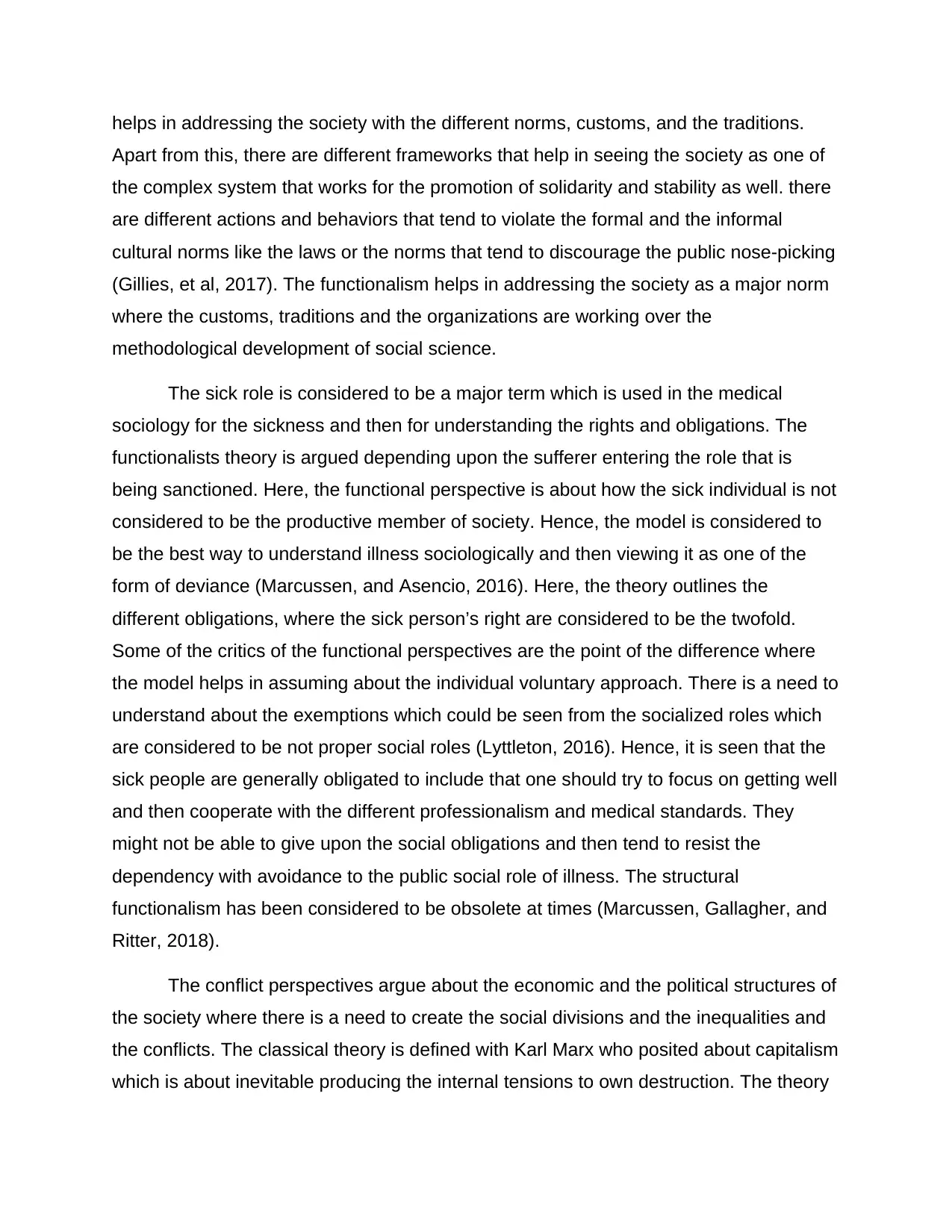
helps in addressing the society with the different norms, customs, and the traditions.
Apart from this, there are different frameworks that help in seeing the society as one of
the complex system that works for the promotion of solidarity and stability as well. there
are different actions and behaviors that tend to violate the formal and the informal
cultural norms like the laws or the norms that tend to discourage the public nose-picking
(Gillies, et al, 2017). The functionalism helps in addressing the society as a major norm
where the customs, traditions and the organizations are working over the
methodological development of social science.
The sick role is considered to be a major term which is used in the medical
sociology for the sickness and then for understanding the rights and obligations. The
functionalists theory is argued depending upon the sufferer entering the role that is
being sanctioned. Here, the functional perspective is about how the sick individual is not
considered to be the productive member of society. Hence, the model is considered to
be the best way to understand illness sociologically and then viewing it as one of the
form of deviance (Marcussen, and Asencio, 2016). Here, the theory outlines the
different obligations, where the sick person’s right are considered to be the twofold.
Some of the critics of the functional perspectives are the point of the difference where
the model helps in assuming about the individual voluntary approach. There is a need to
understand about the exemptions which could be seen from the socialized roles which
are considered to be not proper social roles (Lyttleton, 2016). Hence, it is seen that the
sick people are generally obligated to include that one should try to focus on getting well
and then cooperate with the different professionalism and medical standards. They
might not be able to give upon the social obligations and then tend to resist the
dependency with avoidance to the public social role of illness. The structural
functionalism has been considered to be obsolete at times (Marcussen, Gallagher, and
Ritter, 2018).
The conflict perspectives argue about the economic and the political structures of
the society where there is a need to create the social divisions and the inequalities and
the conflicts. The classical theory is defined with Karl Marx who posited about capitalism
which is about inevitable producing the internal tensions to own destruction. The theory
Apart from this, there are different frameworks that help in seeing the society as one of
the complex system that works for the promotion of solidarity and stability as well. there
are different actions and behaviors that tend to violate the formal and the informal
cultural norms like the laws or the norms that tend to discourage the public nose-picking
(Gillies, et al, 2017). The functionalism helps in addressing the society as a major norm
where the customs, traditions and the organizations are working over the
methodological development of social science.
The sick role is considered to be a major term which is used in the medical
sociology for the sickness and then for understanding the rights and obligations. The
functionalists theory is argued depending upon the sufferer entering the role that is
being sanctioned. Here, the functional perspective is about how the sick individual is not
considered to be the productive member of society. Hence, the model is considered to
be the best way to understand illness sociologically and then viewing it as one of the
form of deviance (Marcussen, and Asencio, 2016). Here, the theory outlines the
different obligations, where the sick person’s right are considered to be the twofold.
Some of the critics of the functional perspectives are the point of the difference where
the model helps in assuming about the individual voluntary approach. There is a need to
understand about the exemptions which could be seen from the socialized roles which
are considered to be not proper social roles (Lyttleton, 2016). Hence, it is seen that the
sick people are generally obligated to include that one should try to focus on getting well
and then cooperate with the different professionalism and medical standards. They
might not be able to give upon the social obligations and then tend to resist the
dependency with avoidance to the public social role of illness. The structural
functionalism has been considered to be obsolete at times (Marcussen, Gallagher, and
Ritter, 2018).
The conflict perspectives argue about the economic and the political structures of
the society where there is a need to create the social divisions and the inequalities and
the conflicts. The classical theory is defined with Karl Marx who posited about capitalism
which is about inevitable producing the internal tensions to own destruction. The theory
⊘ This is a preview!⊘
Do you want full access?
Subscribe today to unlock all pages.

Trusted by 1+ million students worldwide
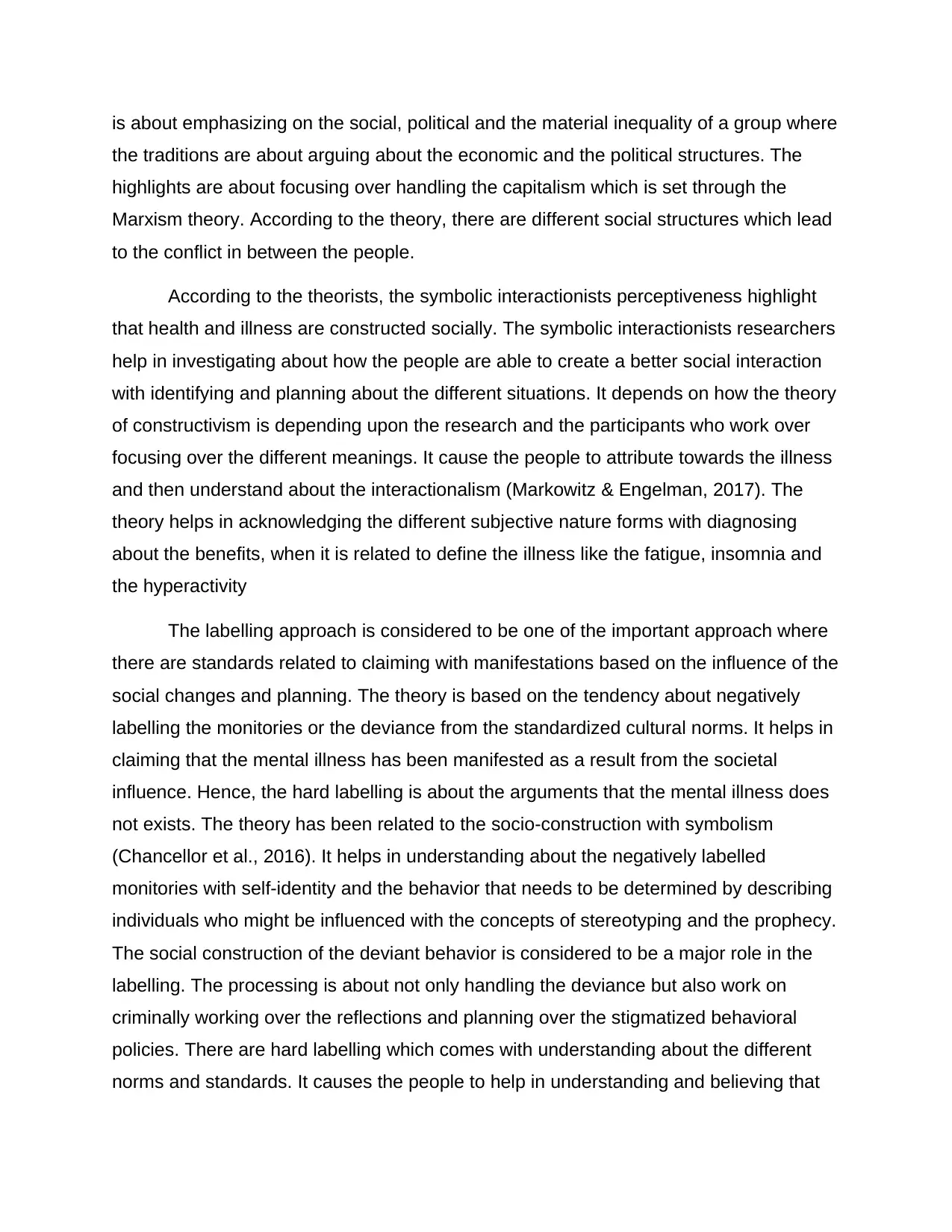
is about emphasizing on the social, political and the material inequality of a group where
the traditions are about arguing about the economic and the political structures. The
highlights are about focusing over handling the capitalism which is set through the
Marxism theory. According to the theory, there are different social structures which lead
to the conflict in between the people.
According to the theorists, the symbolic interactionists perceptiveness highlight
that health and illness are constructed socially. The symbolic interactionists researchers
help in investigating about how the people are able to create a better social interaction
with identifying and planning about the different situations. It depends on how the theory
of constructivism is depending upon the research and the participants who work over
focusing over the different meanings. It cause the people to attribute towards the illness
and then understand about the interactionalism (Markowitz & Engelman, 2017). The
theory helps in acknowledging the different subjective nature forms with diagnosing
about the benefits, when it is related to define the illness like the fatigue, insomnia and
the hyperactivity
The labelling approach is considered to be one of the important approach where
there are standards related to claiming with manifestations based on the influence of the
social changes and planning. The theory is based on the tendency about negatively
labelling the monitories or the deviance from the standardized cultural norms. It helps in
claiming that the mental illness has been manifested as a result from the societal
influence. Hence, the hard labelling is about the arguments that the mental illness does
not exists. The theory has been related to the socio-construction with symbolism
(Chancellor et al., 2016). It helps in understanding about the negatively labelled
monitories with self-identity and the behavior that needs to be determined by describing
individuals who might be influenced with the concepts of stereotyping and the prophecy.
The social construction of the deviant behavior is considered to be a major role in the
labelling. The processing is about not only handling the deviance but also work on
criminally working over the reflections and planning over the stigmatized behavioral
policies. There are hard labelling which comes with understanding about the different
norms and standards. It causes the people to help in understanding and believing that
the traditions are about arguing about the economic and the political structures. The
highlights are about focusing over handling the capitalism which is set through the
Marxism theory. According to the theory, there are different social structures which lead
to the conflict in between the people.
According to the theorists, the symbolic interactionists perceptiveness highlight
that health and illness are constructed socially. The symbolic interactionists researchers
help in investigating about how the people are able to create a better social interaction
with identifying and planning about the different situations. It depends on how the theory
of constructivism is depending upon the research and the participants who work over
focusing over the different meanings. It cause the people to attribute towards the illness
and then understand about the interactionalism (Markowitz & Engelman, 2017). The
theory helps in acknowledging the different subjective nature forms with diagnosing
about the benefits, when it is related to define the illness like the fatigue, insomnia and
the hyperactivity
The labelling approach is considered to be one of the important approach where
there are standards related to claiming with manifestations based on the influence of the
social changes and planning. The theory is based on the tendency about negatively
labelling the monitories or the deviance from the standardized cultural norms. It helps in
claiming that the mental illness has been manifested as a result from the societal
influence. Hence, the hard labelling is about the arguments that the mental illness does
not exists. The theory has been related to the socio-construction with symbolism
(Chancellor et al., 2016). It helps in understanding about the negatively labelled
monitories with self-identity and the behavior that needs to be determined by describing
individuals who might be influenced with the concepts of stereotyping and the prophecy.
The social construction of the deviant behavior is considered to be a major role in the
labelling. The processing is about not only handling the deviance but also work on
criminally working over the reflections and planning over the stigmatized behavioral
policies. There are hard labelling which comes with understanding about the different
norms and standards. It causes the people to help in understanding and believing that
Paraphrase This Document
Need a fresh take? Get an instant paraphrase of this document with our AI Paraphraser
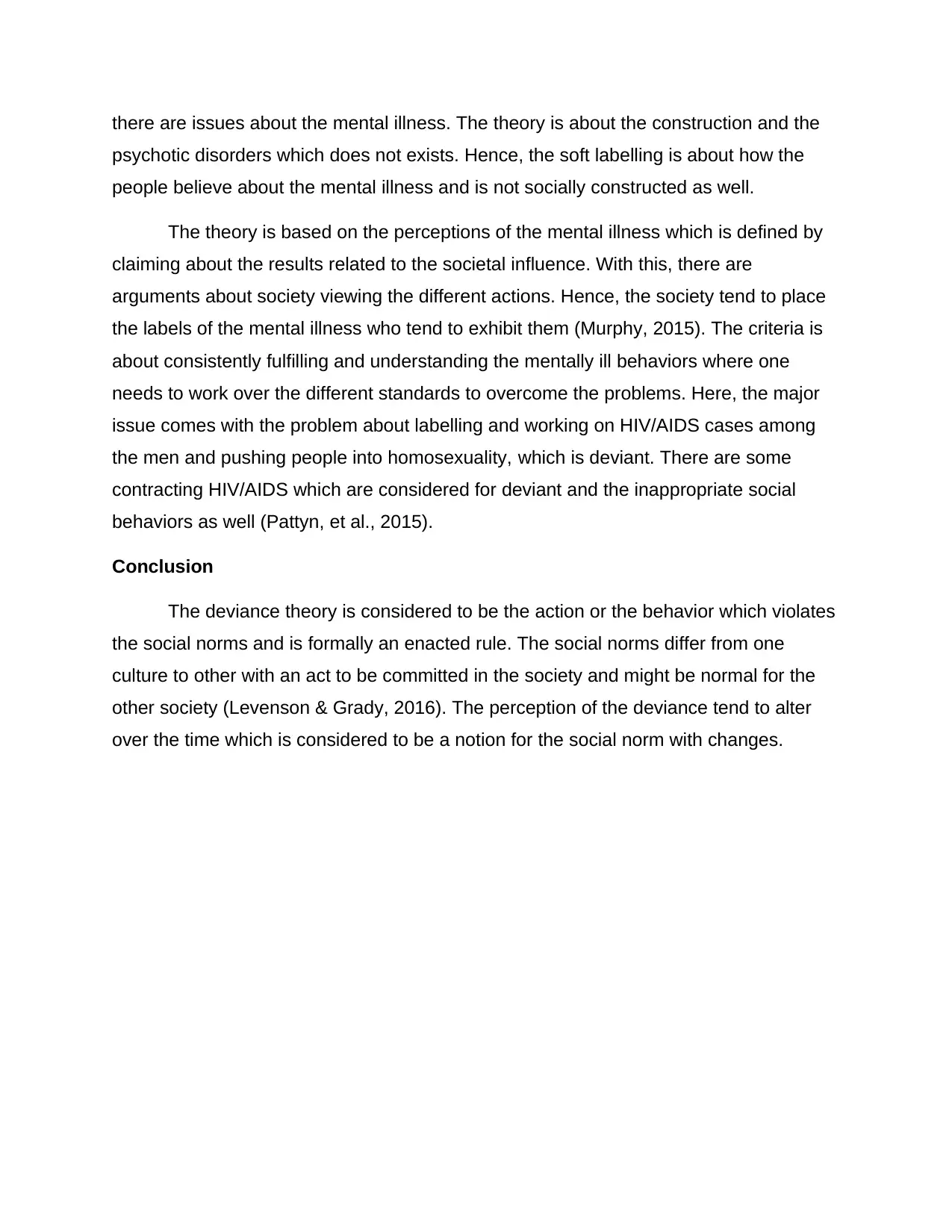
there are issues about the mental illness. The theory is about the construction and the
psychotic disorders which does not exists. Hence, the soft labelling is about how the
people believe about the mental illness and is not socially constructed as well.
The theory is based on the perceptions of the mental illness which is defined by
claiming about the results related to the societal influence. With this, there are
arguments about society viewing the different actions. Hence, the society tend to place
the labels of the mental illness who tend to exhibit them (Murphy, 2015). The criteria is
about consistently fulfilling and understanding the mentally ill behaviors where one
needs to work over the different standards to overcome the problems. Here, the major
issue comes with the problem about labelling and working on HIV/AIDS cases among
the men and pushing people into homosexuality, which is deviant. There are some
contracting HIV/AIDS which are considered for deviant and the inappropriate social
behaviors as well (Pattyn, et al., 2015).
Conclusion
The deviance theory is considered to be the action or the behavior which violates
the social norms and is formally an enacted rule. The social norms differ from one
culture to other with an act to be committed in the society and might be normal for the
other society (Levenson & Grady, 2016). The perception of the deviance tend to alter
over the time which is considered to be a notion for the social norm with changes.
psychotic disorders which does not exists. Hence, the soft labelling is about how the
people believe about the mental illness and is not socially constructed as well.
The theory is based on the perceptions of the mental illness which is defined by
claiming about the results related to the societal influence. With this, there are
arguments about society viewing the different actions. Hence, the society tend to place
the labels of the mental illness who tend to exhibit them (Murphy, 2015). The criteria is
about consistently fulfilling and understanding the mentally ill behaviors where one
needs to work over the different standards to overcome the problems. Here, the major
issue comes with the problem about labelling and working on HIV/AIDS cases among
the men and pushing people into homosexuality, which is deviant. There are some
contracting HIV/AIDS which are considered for deviant and the inappropriate social
behaviors as well (Pattyn, et al., 2015).
Conclusion
The deviance theory is considered to be the action or the behavior which violates
the social norms and is formally an enacted rule. The social norms differ from one
culture to other with an act to be committed in the society and might be normal for the
other society (Levenson & Grady, 2016). The perception of the deviance tend to alter
over the time which is considered to be a notion for the social norm with changes.
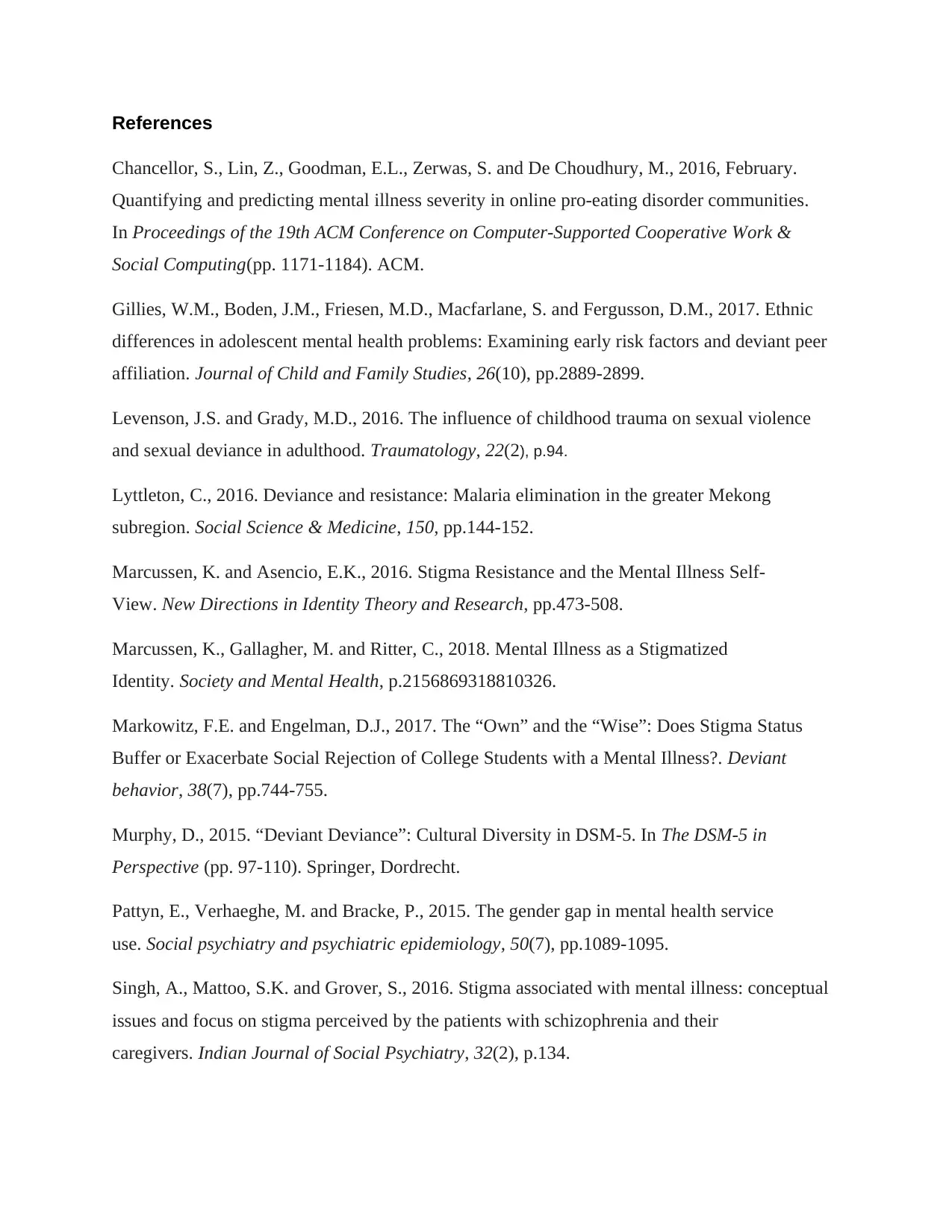
References
Chancellor, S., Lin, Z., Goodman, E.L., Zerwas, S. and De Choudhury, M., 2016, February.
Quantifying and predicting mental illness severity in online pro-eating disorder communities.
In Proceedings of the 19th ACM Conference on Computer-Supported Cooperative Work &
Social Computing(pp. 1171-1184). ACM.
Gillies, W.M., Boden, J.M., Friesen, M.D., Macfarlane, S. and Fergusson, D.M., 2017. Ethnic
differences in adolescent mental health problems: Examining early risk factors and deviant peer
affiliation. Journal of Child and Family Studies, 26(10), pp.2889-2899.
Levenson, J.S. and Grady, M.D., 2016. The influence of childhood trauma on sexual violence
and sexual deviance in adulthood. Traumatology, 22(2), p.94.
Lyttleton, C., 2016. Deviance and resistance: Malaria elimination in the greater Mekong
subregion. Social Science & Medicine, 150, pp.144-152.
Marcussen, K. and Asencio, E.K., 2016. Stigma Resistance and the Mental Illness Self-
View. New Directions in Identity Theory and Research, pp.473-508.
Marcussen, K., Gallagher, M. and Ritter, C., 2018. Mental Illness as a Stigmatized
Identity. Society and Mental Health, p.2156869318810326.
Markowitz, F.E. and Engelman, D.J., 2017. The “Own” and the “Wise”: Does Stigma Status
Buffer or Exacerbate Social Rejection of College Students with a Mental Illness?. Deviant
behavior, 38(7), pp.744-755.
Murphy, D., 2015. “Deviant Deviance”: Cultural Diversity in DSM-5. In The DSM-5 in
Perspective (pp. 97-110). Springer, Dordrecht.
Pattyn, E., Verhaeghe, M. and Bracke, P., 2015. The gender gap in mental health service
use. Social psychiatry and psychiatric epidemiology, 50(7), pp.1089-1095.
Singh, A., Mattoo, S.K. and Grover, S., 2016. Stigma associated with mental illness: conceptual
issues and focus on stigma perceived by the patients with schizophrenia and their
caregivers. Indian Journal of Social Psychiatry, 32(2), p.134.
Chancellor, S., Lin, Z., Goodman, E.L., Zerwas, S. and De Choudhury, M., 2016, February.
Quantifying and predicting mental illness severity in online pro-eating disorder communities.
In Proceedings of the 19th ACM Conference on Computer-Supported Cooperative Work &
Social Computing(pp. 1171-1184). ACM.
Gillies, W.M., Boden, J.M., Friesen, M.D., Macfarlane, S. and Fergusson, D.M., 2017. Ethnic
differences in adolescent mental health problems: Examining early risk factors and deviant peer
affiliation. Journal of Child and Family Studies, 26(10), pp.2889-2899.
Levenson, J.S. and Grady, M.D., 2016. The influence of childhood trauma on sexual violence
and sexual deviance in adulthood. Traumatology, 22(2), p.94.
Lyttleton, C., 2016. Deviance and resistance: Malaria elimination in the greater Mekong
subregion. Social Science & Medicine, 150, pp.144-152.
Marcussen, K. and Asencio, E.K., 2016. Stigma Resistance and the Mental Illness Self-
View. New Directions in Identity Theory and Research, pp.473-508.
Marcussen, K., Gallagher, M. and Ritter, C., 2018. Mental Illness as a Stigmatized
Identity. Society and Mental Health, p.2156869318810326.
Markowitz, F.E. and Engelman, D.J., 2017. The “Own” and the “Wise”: Does Stigma Status
Buffer or Exacerbate Social Rejection of College Students with a Mental Illness?. Deviant
behavior, 38(7), pp.744-755.
Murphy, D., 2015. “Deviant Deviance”: Cultural Diversity in DSM-5. In The DSM-5 in
Perspective (pp. 97-110). Springer, Dordrecht.
Pattyn, E., Verhaeghe, M. and Bracke, P., 2015. The gender gap in mental health service
use. Social psychiatry and psychiatric epidemiology, 50(7), pp.1089-1095.
Singh, A., Mattoo, S.K. and Grover, S., 2016. Stigma associated with mental illness: conceptual
issues and focus on stigma perceived by the patients with schizophrenia and their
caregivers. Indian Journal of Social Psychiatry, 32(2), p.134.
⊘ This is a preview!⊘
Do you want full access?
Subscribe today to unlock all pages.

Trusted by 1+ million students worldwide

1 out of 7
Related Documents
Your All-in-One AI-Powered Toolkit for Academic Success.
+13062052269
info@desklib.com
Available 24*7 on WhatsApp / Email
![[object Object]](/_next/static/media/star-bottom.7253800d.svg)
Unlock your academic potential
Copyright © 2020–2026 A2Z Services. All Rights Reserved. Developed and managed by ZUCOL.





